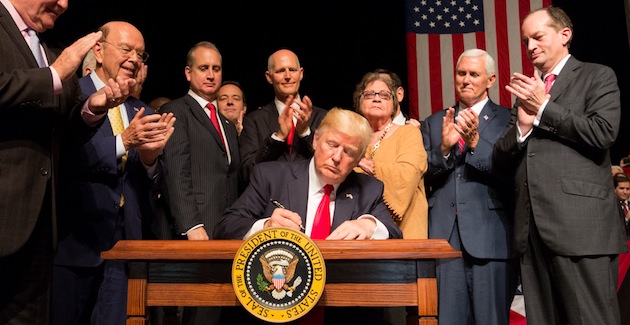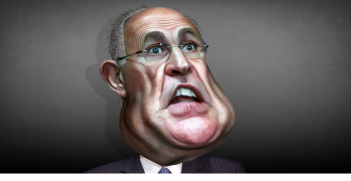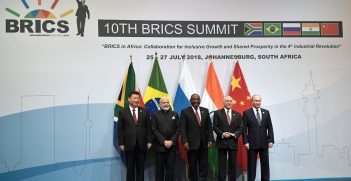Trump Repealism Rolls Back Obama’s Cuba Reforms

Donald Trump’s push to repeal many of the Obama administration’s foreign policy initiatives has extended to the landmark lifting of the embargo against Cuba. Will the new hardline approach be effective in achieving its goal of encouraging political reform and economic liberalisation?
On 16 June, US President Donald Trump announced a long-expected change in US foreign policy towards Cuba. The new policy will roll back many of the Obama administration’s reforms including travel liberalisation, while imposing further restrictions.
[su_quote cite=”Remarks by President Trump on the Policy of the United States Towards Cuba 16 June 2017, Manuel Artime Theater, Miami, Florida, US.”]The exiles and dissidents here today have witnessed communism destroy a nation, just as communism has destroyed every single nation where it has ever been tried. But we will not be silent in the face of communist oppression any longer. You have seen the truth, you have spoken the truth, and the truth has now called us—this group—called us to action.
Last year, I promised to be a voice against repression in our region—remember, tremendous oppression—and a voice for the freedom of the Cuban people. You heard that pledge. You exercised the right you have to vote. You went out and you voted. And here I am like I promised—like I promised.[/su_quote]
Specific elements of the Trump policy include restrictions that prohibit individual travel (with the exception of Cuban Americans who will continue to be able to visit relatives in Cuba and send remittances) and limit non-academic educational travel to organised groups. While the US embassy in Havana will remain, the policy effectively reaffirms the statutory embargo of Cuba.
The stated objectives of the Trump policy are to:
- “enhance compliance with United States (US) law—in particular, the provisions that govern the embargo of Cuba and the ban on tourism”;
- hold Cuba “accountable for oppression and human rights”;
- further US “national security and foreign policy interests”; and
- empower the “Cuban people to develop greater economic and political liberty”.
The policy changes seek to prohibit business, trade and financial transactions between US companies and entities linked to the Cuban military’s holding company Grupo de Administración Empresarial (GAESA). Instead, it seeks to promote direct economic ties between US individuals and entities and the private sector in Cuba. According to the White House, the policy will promote commerce with “free Cuban businesses and pressure the Cuban government to allow the Cuban people to expand the private sector”.
The Trump policy was announced at the Manuel Artime Theater in Miami, Florida, before a gathering of Cuban Americans. The new policy fulfilled a commitment made by the Trump campaign several weeks before the 2016 election in which Donald Trump pledged to roll back the Obama administration’s reforms. It was made in order to secure the presidential endorsement of the Brigade 2506 Veterans Association—the organisation of veterans of the failed 1961 Bay of Pigs invasion of Cuba. Florida Republicans Senator Marco Rubio and Representative Mario Diaz-Balart, both influential advocates for the continuation of the US embargo against Cuba, supported the Trump initiative.
On the day of the announcement, the Cuban government responded in the strongest terms. In a statement published in Cuba’s official newspaper Granma, the government condemned Trump’s action as a “setback in the relations between both countries”.
“Once again, the US government resorts to coercive methods of the past when it adopts measures aimed at stepping up the blockade, effective since February 1962, which not only causes harm and deprivations to the Cuban people and is the main obstacle to our economic development, but also affects the sovereignty and interests of other countries, which arouses international rejection…
“The Government of Cuba condemns the new measures to tighten the blockade, which are doomed to failure, as has been repeatedly evidenced in the past, for they will not succeed in their purpose to weaken the Revolution or bend the Cuban people, whose resistance against aggressions of all sorts and origins has been put to the test throughout almost six decades….”
With the exception of hardline anti-communist Cuban Americans, the Trump administration’s approach to Cuba has limited support within the US. For example, a December 2016 Pew Research Center poll found that 75 per cent approved of the 2015 Obama administration decision to re-establish US relations with Cuba, while approximately 73 per cent favoured ending the trade embargo against Cuba.
Following the Trump announcement, the Engage Cuba Coalition—a US lobby group which advocates for the lifting of the embargo—published a statement noting that the directive would negatively impact Cuban entrepreneurs and that the new restrictions could cost the US economy “billions of dollars and affect thousands of jobs”.
In the days leading up to the Trump announcement, human rights groups, such as Amnesty International, Human Rights Watch and the Washington Office on Latin America, also expressed concerns about the implications of the proposed changes.
Many Republicans also don’t support the policy. On 16 June, Senator Jeff Flake (R-AR), a member of the Senate Foreign Relations Committee, released a statement in which he criticised renewed restrictions on US citizens’ ability to travel to Cuba. Other Republicans known to be critical of the policy include Senator Rand Paul (R-KY), Senator John Boozman (R-AR), Senator Jerry Moran (R-KS), Representative Tom Emmer (R-MN), Representative Rick Crawford (R-AR), Representative Ted Poe (R-TX), Representative Justin Amash (R-MI), Representative Mark Sanford (R-SC) and Representative Rodney Davis (R-IL).
Several conservative organisations and think tanks are also critical of the Trump approach, including the Cato Institute, Reason, Campaign for Liberty and the Federalist.
While some dissidents in Cuba reportedly support a hardline policy approach, it is difficult to ascertain—on account of restricted access to the internet and social media in Cuba—whether the policy has any support among moderates who might be critical of the regime. However, some Cuban academics and entrepreneurs have expressed concern about the implications for Cuba of the election of Donald Trump.
Following the Trump announcement, one academic commented privately that “what happened in Miami… was imaginable”. She added, however, that it would be difficult to reverse what had hitherto been achieved in terms of bilateral engagement and closer ties between the two countries. That said, it was necessary for Cuba to continue to implement political and economic reforms; Cuba “must make deeper and better paced transformations”.
A Cuban entrepreneur commented separately that the Trump policy would impact adversely on tourism and, in particular, on individuals and small businesses involved in the provision of hospitality and accommodation in private dwellings, the so-called ‘casas particulares’. Another academic noted that while the Cuban government and many Cubans had expected the announcement, they were angered to see Trump surrounded by the “most radical members of the Miami hard-right exiles, some of [whom are] associated with the old mafia and wanted by the Cuban police”. Irrespective of whether or not this was the case, there is little doubt that the Trump announcement angered both stalwart supporters of the Cuban government and Cubans of more moderate persuasion.
The new Trump Cuba policy will be implemented through a series of regulations in coming months, the full impact of which remains to be seen. Nevertheless, the policy is another example of the isolationist approach of the current US administration and will likely enhance nationalist and anti-US sentiment among key players within the region, such as Mexico and Venezuela. In terms of its impact on business, US companies and their Cuban counterparts are taking a wait-and-see approach to ascertain how and to what extent their interests will be affected.
The new Trump foreign policy towards Cuba may have additional unintended consequences. It would provide a strategic opportunity for China to enhance its relations with, and influence in, Cuba. China is already Cuba’s third destination for exports after Canada and Venezuela, and its second source of imports after Venezuela. During a 2016 visit to Cuba, where approximately 30 bilateral agreements were signed, Chinese Premier Li Keqiang spoke of the need to deepen their “traditional friendship”, enhance “pragmatic cooperation” and maintain “close cultural exchanges”.
China has previously taken a cautious approach to Cuba. However, in the wake of the Trump announcement, China is likely to assess potential trade and investment opportunities, which may be created by the US vacating the proverbial field, and seek to build on its existing interests, including with the provision of foreign loans.
The coming months will reveal the full extent of the rollback of the Obama administration’s initiatives to liberalise US-Cuba bilateral relations and its implications for the region and beyond. As always, the devil will be in the detail.
Dr Ruth Adler is a writer and historian. Until recently, she was a senior career officer with the Department of Foreign Affairs and Trade, and served as Australian Ambassador to Ireland (2013-2016) and Australian High Commissioner to Brunei Darussalam (2006-2009), with earlier postings to Mexico and the Philippines.
This article is published under a Creative Commons License and may be republished with attribution.





